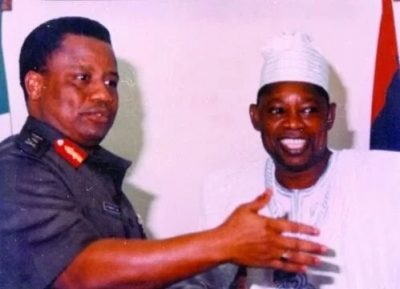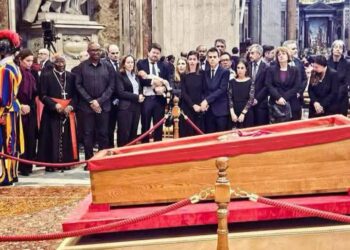The June 12, 1993 Presidential Election in Nigeria is still a complex and multifaceted event, perceived differently by various individuals and groups. Just as the characteristics of an elephant can vary depending on the observer’s perspective, the significance and impact of that election are still subject to diverse interpretations. It is a story that will have no end.
Nevertheless, there is a common denominator that unites Nigerians and foreigners alike; the federal military government’s decision to annul the election was widely condemned as unjust and unacceptable. It was totally unwarranted to every right-thinking member of the society.
Troubling and devastating as the annulment appeared, the Social Democratic Party (SDP) summoned the courage to meet over the matter under the leadership of Chief Tony Anenih, who was then the National Chairman.
The meeting was convened in Benin, the Edo State capital immediately after the annulment. It was held at Government House, otherwise called Dennis Osadebe House.
Billed for 8pm, the meeting did not commence until the flag bearer, Chief M.K.O. Abiola, arrived with Alhaji Abubakar Rimi (both of blessed memories) at about 1am. All the SDP governors and leaders of the party were on hand. The atmosphere was tense, and Benin City was under siege. The meeting lasted till 7am the following day without a definite official statement. Inquisitive Journalists who had kept vigil while the meeting lasted had to ambush Chief Anenih and then National Secretary Sule Lamido for comments. They were initially reluctant to speak but unrelenting pressure forced Anenih and Lamido to summarise the deliberations at the parley in one sentence, “We are going to Abuja to meet with President Ibrahim Babangida to demand that he rescinds the decision annulling the election already won by the SDP’s Abiola… In a nutshell, On June 12 we stand”.
That was exactly the headline of yours sincerely’s story as captured by the then newspaper giant, the Daily Times of Nigeria plc, on its back page. I remember vividly.
It was expected that the political class should stand up to defend Abiola’s mandate. Curiously, the story changed and there was a U-turn after the Abuja meeting with Babangida. Instead of “on June 12, we stand,” the SDP delegation, without providing details, told Nigerians that “they now know better why the election was annulled.”
The story continued to change as the initial protagonists became antagonists in the June 12 struggle. Scores of them began to lobby and indeed got juicy political appointments under the emerging military government of Abacha.
From June 12, we stand it became on June 12, we chop by the same political class.
Abiola was left in the cold wilderness, all alone. The awkward Nigerian system had initially sniffled life out of Abiola’s elegant wife, Kudirat, over the June 12 struggle.
Civil societies, labour unions and Journalists took the gauntlet to fight for the actualisation of the June 12 mandate. By a twist of events, yours sincerely, who covered the election for the Daily Times stables in Benin as well as the first meeting of SDP after the annulment was arrested along with the then Vanguard Correspondent in Benin, Emmanuel Amaize, for allegedly publishing anti-government stories over June 12.
Our offences were those storylines interrogated the police allegations that one of the fathers of Journalism in Nigeria and former Information Minister reputed for moving the motion for Nigeria’s independence in March 1953 Chief Anthony Enahoro was among those who sponsored the pro-June 12 riots that resulted in burning down former Chief of General Staff Admiral Augustus Aikhomu’s house in Irrua, two-time governor of old Bendel State Dr Samuel Ogbemudia’s properties in Benin and Chief Anenih’s Nova hotel in Benin.
It would be recalled that at the time Enahoro was accused of sponsoring the June 12 riots, he was in detention on the orders of the powers that be in Port Harcourt, Rivers State, as the leader of the National Democratic Coalition (NADECO). How can a man in government custody in far away Port Harcourt be the mastermind of a riot in Benin?. That was our story, but then the government saw it differently and ordered our arrest and detention.
The then Police Commissioner in Edo State, Hamisu Isa, as we were later told,d, was on instructions to move us from Benin to Abuja. But the protests from the Nigeria Union of Journalists (NUJ) led by then State chairman Comrade Nasamu Jacobson and NUJ lawyer, Chief Henry Ogbodu SAN halted the move. The police then charged us to court for, among other things, publishing stories likely to cause a breach of peace and opprobrium against the federal military government. The case dragged on for more than one year until it was struck out for lack of credible evidence.
Babangida’s autobiography is ordinarily a good project for the records and contributes to the body of knowledge to enrich our political history. Above all, it is expected to heal the wounds of infamy and chat a road map for a better tomorrow.
Whether the intents and purposes were met, judging by the uproar trailing the unveiling of the book “A Journey in Service”, is another kettle of fish entirely.
A book of this nature authored by a man who has seen it all; the good, the bad and the ugly should ordinarily be conciliatory and reconciliatory to remedy injuries of yesterday and lay a smooth path for the future. Opinion differs but facts are sacred.
For instance, some sordid details of that era or apportioning blame of that chequered history, especially to the dead who have no opportunity to reply, arguably lowered the bar. It adds no value to regurgitating over the past or missed opportunities.
However, Babangida, as Commander-In-Chief of that era, has taken absolute responsibility for that annulment. He has apologised and, in his words, after taking stock of the June 12 debacle, said he would have done things differently. The past should serve as a useful guide for a better tomorrow.
The armed forces, academicians, historians, politicians and students will find the Babangida book handy for many years to come.
ENDS..










































This quite interesting and unforgetful memory to reckon with.